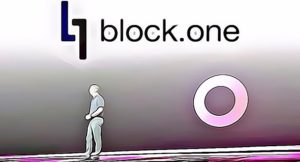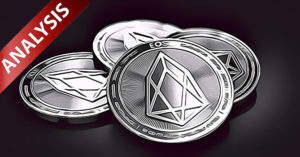- Telecommunications Giant Vodafone Leaves the Libra Association
- Group of Central Banks Assesses Developing Central Bank Digital Currencies
- South Korea Might Impose 20 Percent Tax on Cryptocurrency Profits
- Report: Terrorists Increasingly Use Crypto to Raise Funds Anonymously
- Canadian Securities Administrators Subject Crypto Exchanges to Securities Laws
EOS (EOS) Price and Analysis
EOS Overview
The EOS.IO platform was published in 2017 after being developed by the private company block.one. The open source software was released the following year in June 2018.
EOS is a community-driven blockchain that allows the development and implementation of large scale decentralized apps (dApps). EOS is essentially a development platform for dApps which in terms of functionality is close to an operating system. EOS is also a blockchain protocol, which just means that it built its blockchain from the ground up and doesn’t rely on any other blockchain or its technology for their survival. Protocol blockchains are considerably rarer than app blockchains which account for 90% of the market.
The goal of EOS is to be fast, cheap, and highly scalable – allowing for thousands of transactions per second and upwards. Scalability has become extremely important for newer cryptocurrencies, since some of the older ones, like Bitcoin, can’t support high volumes of transactions. If cryptocurrency is ever to become the norm, then high volumes of transactions is a must since no one will see crypto as an improvement to traditional currencies if they have to wait days and days to transfer money.
The EOS platform and its infrastructure also support smart contracts for dApps, and if you’ve been following crypto news for a while, you’ll know that smart contracts are the current buzz word in the industry. This makes EOS a major competitor to Ethereum; however, EOS is more scalable and flexible than Ethereum, although it is less popular so Ethereum doesn’t have much to worry about for the time being.
So what about the cryptocurrency part? The EOS ecosystem is made up of two parts, the EOS.IO platform we have just been discussing, and EOS tokens, the cryptocurrency. The EOS token is the cryptocurrency on the EOS network, the same way Ether is the cryptocurrency of the Ethereum network. Where it tends to get a little confusing in the crypto space is that the platforms and the cryptocurrencies are often used interchangeably.
In order to build and run decentralized apps on the EOS network, a developer needs to hold EOS tokens. Another interesting feature is that a token holder who chooses not to run any apps on the network can rent their bandwidth out to others who may need it to build their apps. This is one of the reasons EOS is considered a community-driven platform.
Latest EOS News

Block.one Announces EOSIO 2.0: More Security, Speed and Stability
Read More

No Confidence Vote: Weiss Crypto Ratings Downgrades EOS From A to C
Read More

Survey: More Crypto Owners Voted for Hillary Clinton than for Donald Trump
Read More

Block.one Rolls Out an Improved Version of EOSIO for Developers
Read More

Block.one, EOS Creator, Slapped with $24 Million Fine for Unlicensed ICO
Read More

Block.one, EOS Parent, to Open New Headquarters in Washington D.C.
Read More

EOS Technical Analysis (August 27): A Bullish Momentum
Read More

Wallet and Custody Services Provider BitGo Adds Support for EOS
Read More

EOS Price Technical Analysis (June 4): Uptrend but Indecisive
Read More

Block.one Launches Crypto Social Network ‘Voice’ Built on the EOS Blockchain
Read More
Digital favorites
- Siti Di Scommesse
- Casino Bonus Senza Deposito Immediato
- Best Casinos Not On Gamstop
- Casinos Not On Gamstop
- UK Casinos Not On Gamstop
- Non Gamstop Casinos
- UK Casinos Not On Gamstop
- Casino Not On Gamstop
- Non Gamstop Casino
- Slots Not On Gamstop
- Meilleur Casino En Ligne France
- Gambling Sites Not On Gamstop
- オンライン カジノ おすすめ
- Gambling Sites Not On Gamstop
- Non Gamstop UK Casinos
- UK Casino Sites Not On Gamstop
- UK Casinos Not On Gamstop
- Non Gamstop Casinos UK
- Non Gamstop Casino Sites UK
- Best Slot Sites
- UK Online Casinos Not On Gamstop
- Best Non Gamstop Casino
- Best Sports Betting Sites Not On Gamstop
- Meilleur Casino En Ligne
- Migliori Casino Online
- Meilleur Site De Casino En Ligne
- Pari Sportif Belgique
- Siti Casino
- Meilleur Site De Paris Sportif International
- 익명 카지노
- Fm 카지노
- Casino Sans Verification
- Real Money Casino App No Deposit
- Siti Non Aams Bonus Senza Deposito
- Casino Non Aams
- Meilleur Casino En Ligne Belgique
- Site De Poker
- Casino En Ligne 2026
- Meilleur Casino En Ligne 2026
- Casino Online Non AAMS
